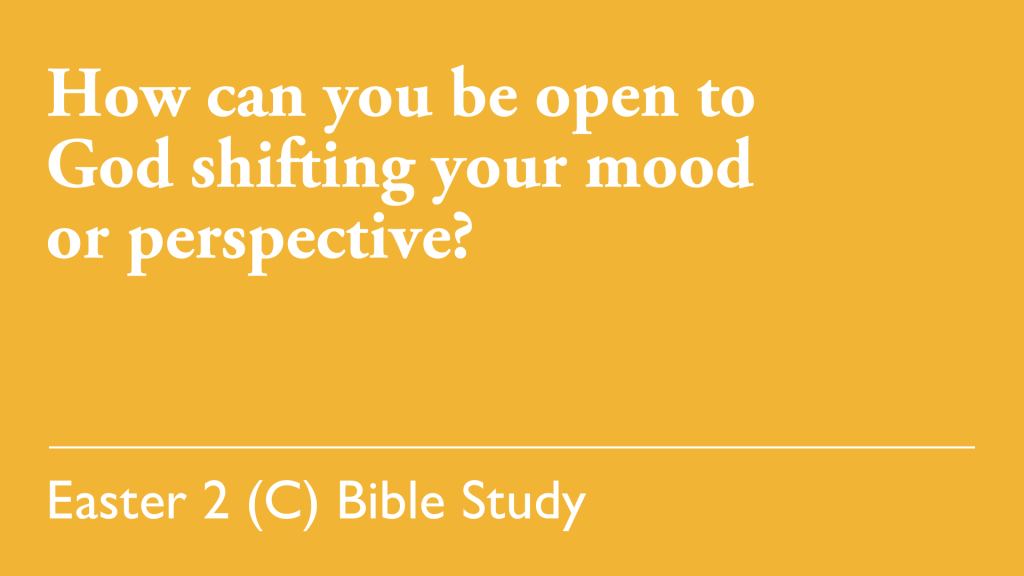This page is available in: Español
Bible Study: Easter 2 (C) – April 27, 2025
April 27, 2025
RCL: Acts 5:27-32; Psalm 118:14-29 or Psalm 150; Revelation 1:4-8; John 20:19-31

Acts 5:27-32
This lesson comes in the midst of the apostles’ ministry in Jerusalem. They have been performing wonders, healing, and teaching. They are gathering new believers and forging a communal economic system. The high priest has imprisoned the apostles, but an angel of the Lord freed them during the night and told them to resume their teaching. Now, the high priest and temple officials find Peter and the apostles teaching again in Jesus’ name, and they are popular: the police who bring them before the council of the elders of Israel have done so without violence because they fear the people will stone any who attack Jesus’ apostles. After this exchange, the council is so enraged they want to kill the apostles. A respected Pharisee urges them not to, pointing out that if this movement is human-led, it will fizzle out, but that if it is truly from God, they don’t want to be found fighting against God.
- How do you distinguish between human authority and God? How do you discern what might be God’s will, that is, what paths or callings come from God?
- How can you draw strength from God to stand up for justice and do good work in the world, even when doing that work is countercultural or dangerous?
Psalm 118:14-29
Psalm 118 is a thanksgiving in which the psalmist credits God with rescue and salvation. The first 13 verses include calling on the Lord from a place of distress– surrounded by enemies– and taking refuge in God, who banishes fear. The psalmist seems to make some confession for their misdeeds and sees the action of God even in their punishment. We hear how God elevates the rejected stone into the chief cornerstone, able to reverse fortunes and worthy of praise for that saving work.
The second half of v. 27, about processing with branches to the altar, might be a “ritual instruction that accidentally became part of the psalm” (New Oxford Annotated Bible, p. 871). This reminds us how long the psalms have been used to worship God, and ties our own singing, chanting, and recitation of the psalms back through generations of our faith’s history.
- Do you thank God when you step out of dark periods of life, out of danger or sorrow? What role do you feel God plays in resolving bad situations?
- Can you imagine singing this psalm 1000, 2000, or 3000 years ago? How does it feel to recognize that our scripture and songs of worship have been spoken by people for so long?
Revelation 1:4-8
John’s greeting to the seven churches makes God’s power and omnipresence clear. Jesus is placed in the positions of both Caesar (ruler of the kings of the earth) and Messiah (who freed us from our sins). As the seven churches face varying levels of religious persecution in their Roman context, John is helping make theological sense of a Messiah– a figure who was supposed to free God’s people from oppression – but who, instead, was crucified. More than freeing us from worldly hardship, Jesus frees us from the cosmic forces of sin and death.
Apocalypse means “unveiling” rather than “destruction,” and the apocalyptic genre involves a glimpse into the spiritual cosmic realm that stays hidden from most humans. John reassures people who are hurting and suffering that their faith is well-placed, that God is “the Alpha and Omega… who is and who was and who is to come, the Almighty.”
- Are there times when reality seems bleak and you find yourself leaning into your faith and God for hope? What does hope in God feel like?
John 20:19-31
We find the disciples are scared, confused, and probably unsure of what to do next. They have seen Jesus killed and either seen or heard about his tomb being empty. They’re trying to make sense of that mystery in light of what Jesus taught them about his path. Jesus shows up amid this fear and uncertainty and invites them to peacefulness – twice. Encountering Jesus does not resolve the mystery; in fact, it increases the strangeness, but it does shift the mood of the disciples from fear to joy.
This passage is infamously called “Doubting Thomas.” The Greek word we translate as “doubt,” apistos, means “unbelieving” or “unfaithful.” Thomas had missed out on the significant event of encountering the risen Christ when Jesus showed everyone else his hands and side. Thomas is asking to be included, to have the same experience the other disciples had, and to personally encounter Jesus. We hear Jesus permit Thomas to touch his wounds, but that Thomas believed simply from seeing. The reader of this Gospel is called to believe that Jesus rose from the dead only from hearing about it.
- What is the relationship between experiencing (seeing, touching, encountering, feeling) and believing? How does your personal experience influence your belief? How does what you learn from others influence your belief?
- What helps you find peace or joy when you are feeling fear or confusion? Do you turn to God for help in finding peace and joy? How can you be open to God shifting your mood or perspective?
Harlowe Zefting is a seminarian at Church Divinity School of the Pacific.
This page is available in: Español
Don’t forget to subscribe to the Sermons That Work podcast to hear this sermon and more on your favorite podcasting app! Recordings are released the Thursday before each liturgical date.
Receive Free Weekly Sermons That Work Resources!
This page is available in: Español


